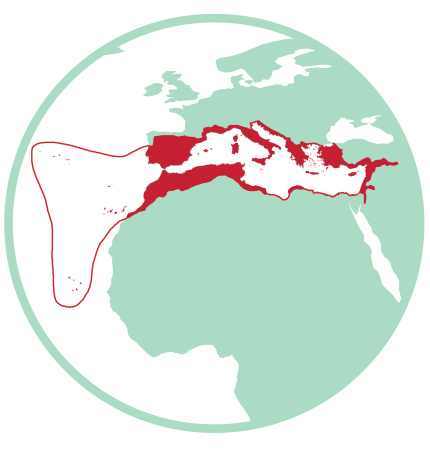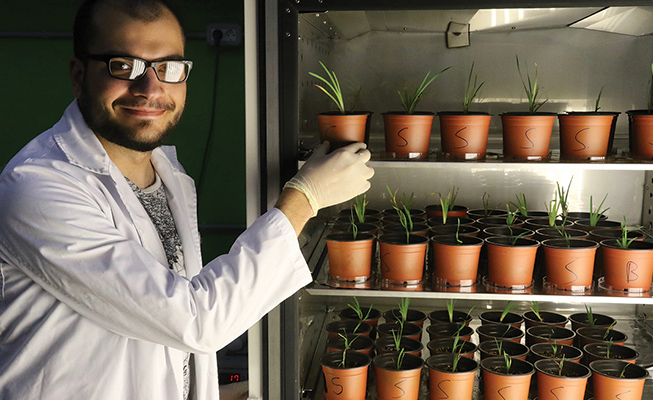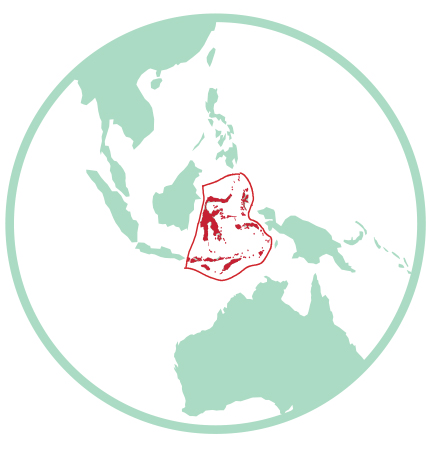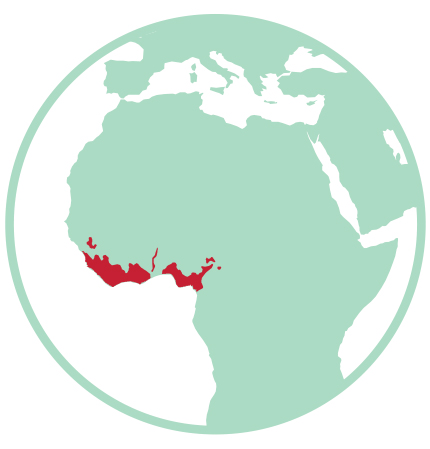Conserving Species
Biodiversity conservation is the core of CEPF’s work. The amazing array of species in the world’s biodiversity hotspots is critical to maintaining healthy ecosystems that people rely on for food, fresh water, fuel, medicines, climate change mitigation and more. Biodiversity also is important to communities for its spiritual, aesthetic and recreational values. The efforts of CEPF grantees to protect and learn more about species benefit us all.
Mediterranean Basin Biodiversity Hotspot

Though a small country of 10,000 square kilometers, Lebanon has numerous microclimates that shelter almost 2,600 different species of plants, many found nowhere else on Earth.
Pressure from urban development, along with a general lack of awareness, has put these fragile ecosystems at risk. A CEPF-funded project completed by the University of Saint Joseph (USJ) in 2016 made tremendous headway in protecting some of Lebanon’s rare flowers: Two plant micro-reserves were established, and work began on building the first national red list for threatened species.

Professor Magda Bou Dagher Kharrat, project lead, and her team continued their work after the CEPF grant and achieved an important breakthrough in 2018: They determined how to successfully germinate three of Lebanon’s most endangered flowers in a laboratory setting.
“It’s taken us four years of working on the germination protocol in our laboratory for seed germination and conservation. Initially, less than 3 percent of the seeds would germinate after six or seven months,” said Bou Dagher Kharrat.
In the wild, the seeds are naturally dispersed by ants that hide them underground and eat a small portion. “We found a way to imitate this process and now, in two weeks, we have germination,” she added.
USJ has taken Iris bismarckiana germinated in the lab and successfully planted them in the Sarada micro-reserve. “When there are two flowers found far away from each other, we plant others between them, to create a corridor,” Bou Dagher Kharrat explained. This process has been applied to other endangered iris species, too.
Now USJ is using a new grant from CEPF to expand its efforts on behalf of Lebanon’s plants, including integrating plants into the site management of three existing reserves, strengthening the management of the Sarada micro-reserve, and testing conservation approaches at some archaeological sites.
Wallacea Biodiversity Hotspot

On the islands of North Maluku Province, Indonesia, the white cockatoo (Cacatua alba) and chattering lory (Lorius garrulus) are long-suffering victims of a thriving illicit bird trade.
College students and others in the distant East Java Province enjoy the birds as pets, creating a persistent and unsustainable demand. CEPF grantee PROFAUNA, however, is working with Maluku communities to protect the birds. Initial research showed that during high season—November to March—more than 3,000 birds were being captured every month. PROFAUNA staff traveled to 58 villages around North Maluku to promote parrot protection to local people, including poachers.
Recognizing the need to address the demand side of the equation, the project team conducted university outreach to confront the problem at its source. Project staff talked to more than 2,300 school and university students in East Java, urging them not to buy parrots.
“Most people did not know the birds were endangered,” said Swasti Prawidya Mukti, PROFAUNA’s campaign officer. “They see them as all being the same and don’t think about which ones come from where, let alone the threats those species face.” PROFAUNA informed students about the species and explained what is happening in their natural habitat, including the disappearance of the white cockatoo from some parts of the islands. The project team also campaigned to raise awareness among the general public.
In North Maluku, PROFAUNA convened the first-ever meeting of parties involved in the parrot protection effort, including the Nature Conservation Agency, the police and the army, traditional and governmental leaders, NGOs and youth groups. The result has been several joint activities, including field patrols, follow-up meetings and education activities. “As indicated by our second investigation/survey at the end of the project, parrot poaching has declined by more than 70 percent,” Mukti said. “We are hopeful that with more education, the local people may stop poaching and trading parrots altogether.”
PROFAUNA continues to expand its work, planning to eventually cover the whole of North Maluku Province.
Guinean Forests of West Africa Biodiversity Hotspot

In southeastern Nigeria, the Wildlife Conservation Society (WCS) is taking a multifaceted approach to saving the Critically Endangered Cross River gorilla (Gorilla gorilla diehli), a subspecies of the western gorilla (Gorilla gorilla). The wild population of Cross River gorillas is estimated at only 300.
“Although it is the most endangered of all four gorilla subspecies, there is growing optimism that the Cross River gorilla can be saved through a landscape approach that strengthens the management of existing protected areas and works with local communities to protect important habitat corridors,” said Andrew Dunn of WCS.
Hunting and habitat loss are key threats. A grant from CEPF is funding longer, more frequent patrols by rangers, and generating data to inform future patrol strategies. Rangers and guards use an app-enabled monitoring tool to identify and record signs of human activity, as well as the presence of gorillas and other noteworthy species.

Representatives from the local community are teaming up with guards working in protected areas to monitor habitat where the Cross River gorillas exist but are not specifically protected. In some cases, agricultural land separates protected areas and unprotected gorilla habitat. To reconnect these habitats, WCS is helping communities co-manage important land corridors and encouraging cocoa producers to plant in the shade. Shade-grown crops are more productive and command a higher price while minimizing the physical barriers that separate gorilla populations. It is a rare opportunity for increased yields and profits, as well as benefits for the gorillas.
The project team is also conducting outreach to change local attitudes and practices related to watershed conservation and to encourage sustainable livelihood activities such as cultivating bush mangos.
Photo Credits
Iris sofarana grown in the lab. © O. Langrand
Cross River gorilla (Gorilla gorilla diehli), Nigeria. © WCS Nigeria Program



